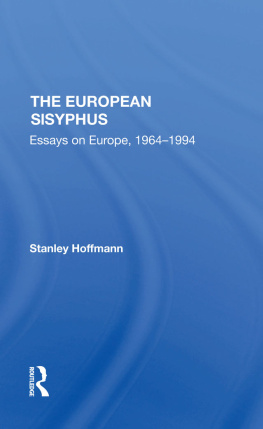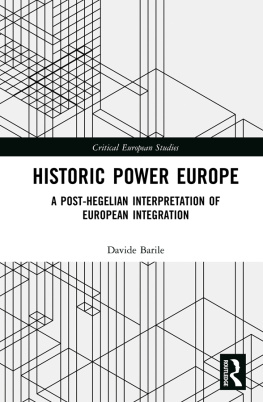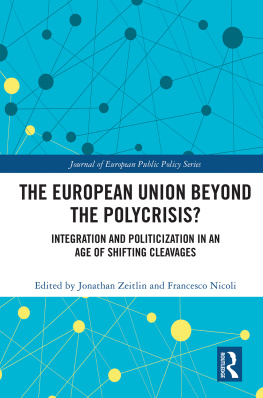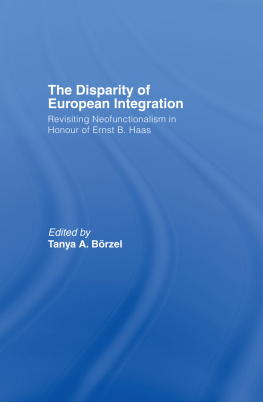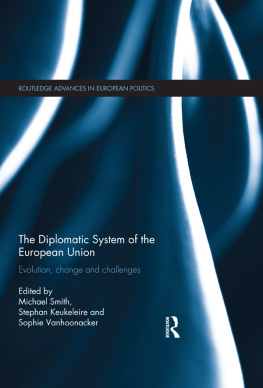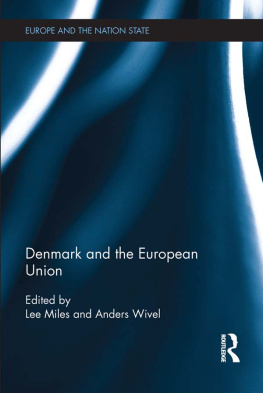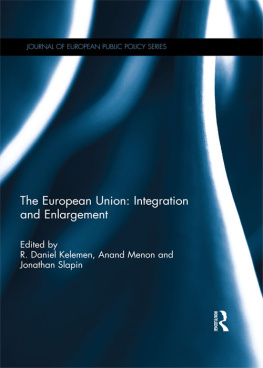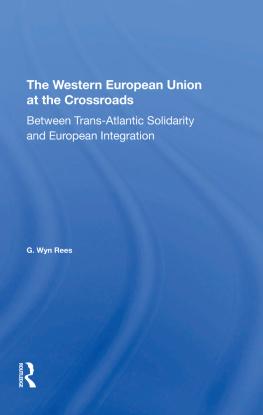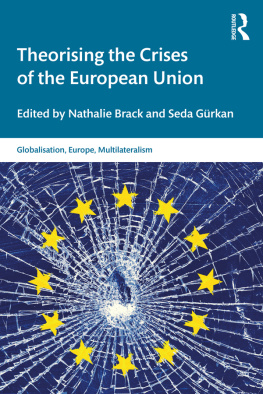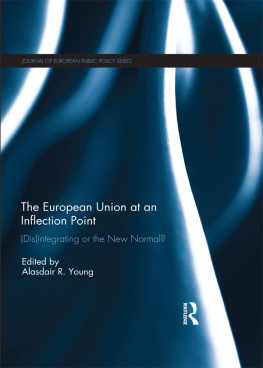First published 1995 by Westview Press, Inc.
Published 2019 by Routledge
52 Vanderbilt Avenue, New York, NY 10017
2 Park Square, Milton Park, Abingdon, Oxon OX14 4RN
Routledge is an imprint of the Taylor & Francis Group, an informa business
Copyright 1995 Taylor & Francis
All rights reserved. No part of this book may be reprinted or reproduced or utilised in any form or by any electronic, mechanical, or other means, now known or hereafter invented, including photocopying and recording, or in any information storage or retrieval system, without permission in writing from the publishers.
Notice:
Product or corporate names may be trademarks or registered trademarks, and are used only for identification and explanation without intent to infringe.
Library of Congress Cataloging-in-Publication Data
Hoffmann, Stanley.
The European Sisyphus: essays on Europe, 1964-1994 / Stanley Hoffmann.
p. cm.(The new Europe: interdisciplinary perspectives)
Includes index.
ISBN 0-8133-2380-0 (HC). ISBN 0-8133-2381-9 (PB)
1.EuropePolitics and government1945- I. Title. II. Series: New Europe (Boulder, Colo.)
D843.H592 1995
940.55dc20
94-28821
CIP
ISBN 13: 978-0-367-29190-7 (hbk)
Permissions to reprint are gratefully acknowledged.
Reprinted by permission of Ddalus, Journal of the American Academy of Arts and Sciences, from the issue entitled "The Contemporary University: U.S.A.," Fall 1964, vol. 93, no. 4 (pp. 1244-1297).
Reprinted by permission of Ddalus, Journal of the American Academy of Arts and Sciences, from the issue entitled "Europe Through a Glass Darkly," Spring 1994, vol. 123, no. 2 (pp. 1-23).
Reprinted from Decline or Renewal ? France Since the 1930s (pp. 363-369 and 509-512) by Stanley Hoffmann. Copyright 1960, 1964, 1968, 1971, 1972,1974 by Stanley Hoffmann. Used by permission of Viking Penguin, a division of Penguin Books USA Inc.
Reprinted, with deletions of text, from "No Trumps, No Luck, No Will: Gloomy Thoughts on Europe's Plight," in Atlantis Lost: U.S.-European Relations After the Cold War, James Chace and Earl C. Raven al, eds. (New York New York University Press, 1976), pp. 1-46. Used by permission of the publisher and the Council on Foreign Relations.
Reprinted, with deletions of text, from "Uneven Allies: An Overview," in Western Europe: The Trials of Partnership, David S. Landes, ed. (Lexington, Mass.: Lexington Books, 1977), pp. 55-110. Used by permission.
Reprinted, with notes renumbered, by permission of Ddalus, Journal of the American Academy of Arts and Sciences, from the issue entitled "Looking for Europe," Winter 1979, vol. 108, no. 1 (pp. 1-26).
Reprinted from the Journal of Common Market Studies, September/ December 1982, vol. 21, no. 1-2 (pp. 21-37), by permission. An earlier version of this chapter was presented to the conference of "Europeanists" in Washington, D.C., in October 1980.
Reprinted from Foreign Affairs, the issue entitled "The European Community and 1992," Fall 1989, vol. 68, no. 4 (pp. 27-47), by permission.
Reprinted, with deletion of the cartoon, from the New York Review of Books , January 18, 1990, vol. 36, no. 21-22. Used by permission.
Reprinted from Survival, the issue entitled "Arms Control and the New Strategic Environment," July/August 1990, vol. 32, no. 4 (pp. 291-298), by permission.
Reprinted from Foreign Policy, the issue entitled "The Emerging World System," Winter 1990-91, no. 81 (pp. 20-38). Used by permission.
Reprinted by permission from The Shape of the New Europe, Gregory F. Treverton, ed. (New York: Council on Foreign Relations Press, 1991), pp. 194-220.
Reprinted, with deletion of cartoons, from the New York Review of Books, May 27, 1993, vol. 41, no. 10, by permission.
I
This collection of essays gathers pieces written over a period of thirty years, 1964 to 1994. They comment on the development and difficulties of European integration. First, it was the European Economic Community (EEC), later the European Community (EC); now it is the European Union. It has grown from its original six members to the current twelve, and if the four newly admitted applicants get their electorates to approve their accession, the European Union (EU) will soon have sixteen memberswith several more possible: Former members of the late Soviet bloc are knocking at the door. One of my reasons for putting these pieces together is my belief that many of the issues that trouble the EU today have plagued it from the beginning and have not been resolved. It is this continuity in flaws and obstacles that has led me to begin the collection by juxtaposing the oldest essay, written in 1964an essay that emerged from and reacted to the generally optimistic view of Europe conveyed by the Daedalus issue called "A New Europe?" (1963)and the most recent, which explicitly "revisits" the landscape of 1964. It isn't only European integration that displays the same ambiguities, hesitations, and failings over this long period; the reader will find that my preoccupations and emphases have remained quite constant as well.
A second reason for assembling these pieces is that they provide a view of evolution and change, an examination of the crises and turning points in the history of European integration. The essays fall into three broad clusters: Union, of Germany's unification and the end of the cold war. Those chapters also discuss the effects of the new and prolonged recession of the late 1980s and early 1990s on the construction of a united Europe.
II
Although minor cuts have been made in
The reader may find some of my remarks in are additional danger signals for the believers in the inevitable progress of ever closer European integration: In different ways, both these changes of attitudes reflect a real nostalgia for the days of the sovereign nation-state. The French rediscovery of the past(s)however fragmented and pluralisticexpresses a deep worry about the erosion and corrosion of national identity, partly caused by integration into a European entity no longer dominated by France.
III
Two of my central concerns that inspired these essays are the connection between Western Europe and the United States and the nature of the European entity. Much has changed with respect to both over the past thirty years. ) that the weight of the United States on and in Europe had much decreased. The end of the cold war, the collapse of George Bush's vision of a world order in which the USSR would follow America's lead and in which, in effect, the Rooseveltian vision of 1943-1945 would be finally realized, and Bill Clinton's sharp turn toward domestic reforms and policies geared to a U.S. economic renaissance have transformed the U.S.-West European relationship. The recent acceptance by the United States of greater European autonomy within NATO and France's acceptance of this less U.S.-dominated NATO as an at least temporary framework for distinctive European security concerns (even "out of area," as in Yugoslavia) are the result of U.S. policy reorientation and France's belated awareness of and adjustment to it.

